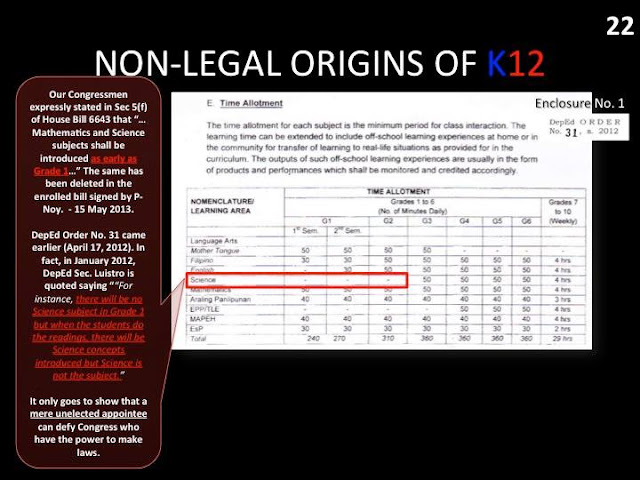Why the Philippines' K to 12 Is Unconstitutional
A group called Negros Movement for Quality Education shares on Facebook contents of one of the petitions before the Philippines Supreme Court against Republic Act 10533, the law behind the new DepEd's K to 12 curriculum. Negros is the fourth largest island in the Philippines and is composed of two provinces, Negros Occidental and Negros Oriental. It has a population of about 4 million. One of its cities, Bacolod, is home to a Parents Teachers Association Federation that is highly critical of DepEd's K to 12.
Although the petition focuses mainly on major discrepancies between the bill passed by Congress and the version signed into the law by the president, it is clear that there are likewise objections to the substance behind the differences between the two versions. Here are some of the discrepancies that are deemed substantial and are therefore clearly contrary to the initial goals of lawmakers.
- Science is supposed to be introduced as early as first grade
- Teachers, parents as well as elders of indigenous communities are supposed to be part of the Curriculum Consultative Committee
- Subjects in tertiary education that are mandated by law but are about to be removed to reduce the general education requirements in higher education must be included in the new K to 12 curriculum.
The law was signed on May 2013, but new high school curriculum was ordered to be implemented on April 2012, a year before the bill became law. As a result, students who finished 10th grade this year are no longer allowed to enter college without going through two additional years of basic education. Of course, there are objections to the law that go beyond discrepancies between versions. The law after all makes the serious mistake of equating K to 12 with compulsory education. Most countries have ten or even less years of compulsory education. The Philippine Constitution mandates only the six years of elementary education as compulsory. Republic Act 10533, DepEd's K to 12 curriculum, therefore amends the Philippine constitution.
For those who are not familiar with the reasons why some are against DepEd's K to 12, here is a series of slides prepared by the Negros Movement for Quality Education.
Negros Movement for Quality Education has also shared in a separate post part of the response of the solicitor general to this petition:
THE TEXT OF THE ENROLLED BILL AND R.A. NO. 10533 ARE VERBATIM REPRESENTATIONS OF THE FINAL CONSOLIDATED BILL APPROVED BY THE SENATE AND HOUSE OF REPRESENTATIVES.In this case, perhaps, it is understandable why the Supreme Court does not see a need for oral arguments. The Court simply has to figure out who is submitting the correct documents. Nonetheless, the other petitions against K to 12 tackle the substance of the law. For this, I do hope that the justices have the eyes to see since they have refused to use their ears to hear the pleas of the people.
The text of the enrolled bill which was eventually signed into law as R.A. 10533 is not different from the consolidated bill drafted by the Bicameral Conference Committee and approved by the Senate and House of Representatives.
A cursory reading of the consolidation of Senate Bill No. 3286 and House Bill No. 6643 in the records of Congress would show that the text of the consolidated bill approved by both the Senate and the Houses of Representatives was reproduced verbatim in the enrolled bill signed into law as R.A. No. 10533. The petitioners erroneously rely on the Joint Explanation of the Conference Committee on the Disagreeing Provisions of Senate Bill No. 3286 and House Bill No. 6636 and overlook the caveat at the end of the Joint Explanation which states: “In case of a conflict between the statements/amendments stated in this Joint Explanation and that of the provisions of the consolidated bill in the accompanying Conference Committee Report, the provisions of the latter prevail.”



























Comments
Post a Comment